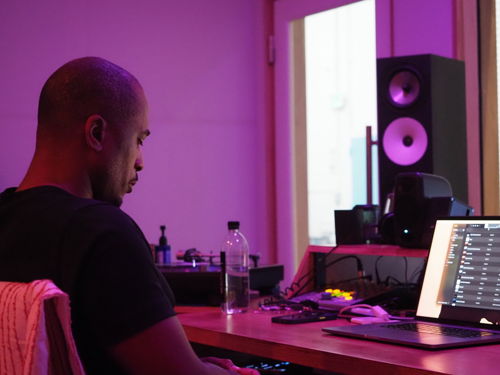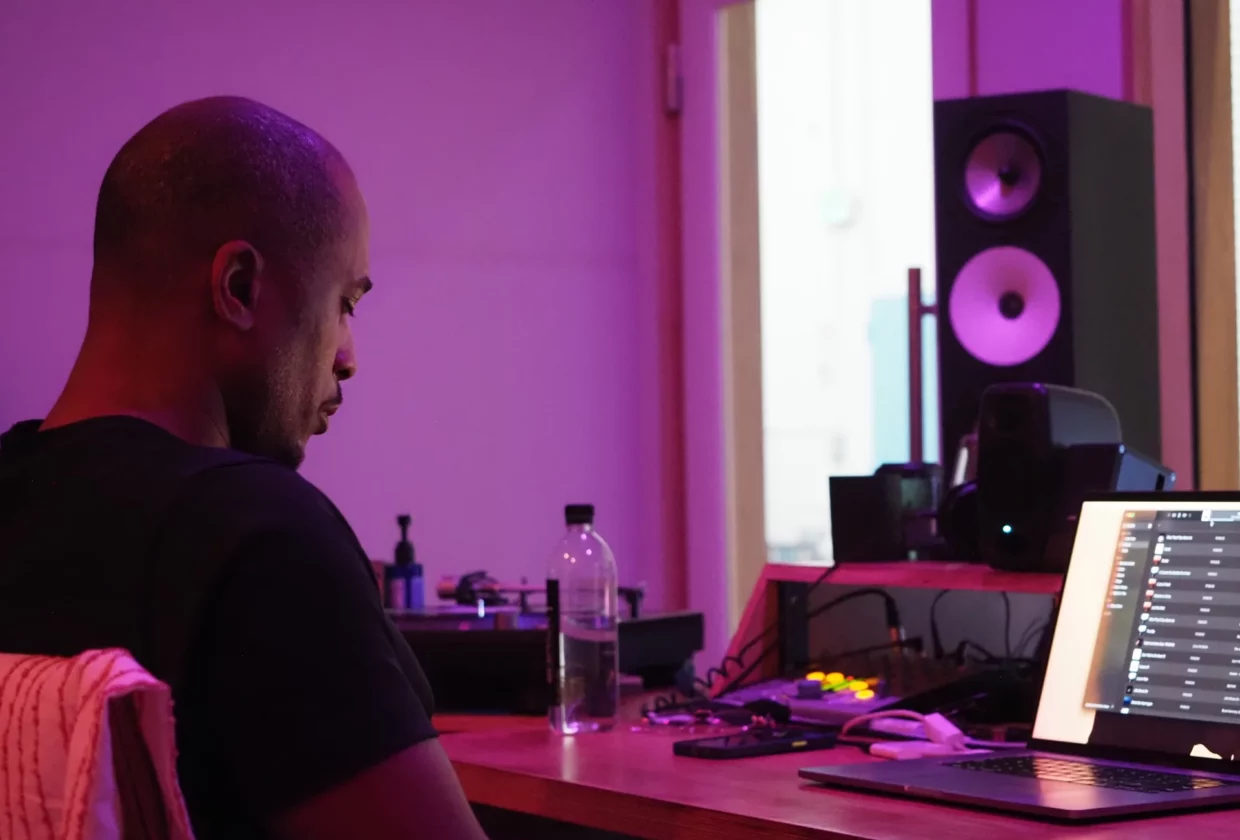Ali Shaheed Muhammad has worn many hats during the course of his storied music career. Perhaps best known as the founding DJ and producer of legendary hip-hop group A Tribe Called Quest, Muhammad has gone on to work with artists like The Weeknd and D’Angelo all while becoming a go-to composer and producer for TV shows like Marvel’s Luke Cage, Raising Canaan, and Reasonable Doubt and co-founding jazz record label and concert series Jazz Is Dead with Adrian Younge. As Muhammad’s workload increased, he began to record and mix more of his own material. This led him to recognize the need for more accurate monitoring. “I had worked with a lot of different speakers in the past, but I was looking for a speaker that could give me a bit more clarity,” he says. After investigating his options, Muhammad landed on one standout manufacturer: Amphion.
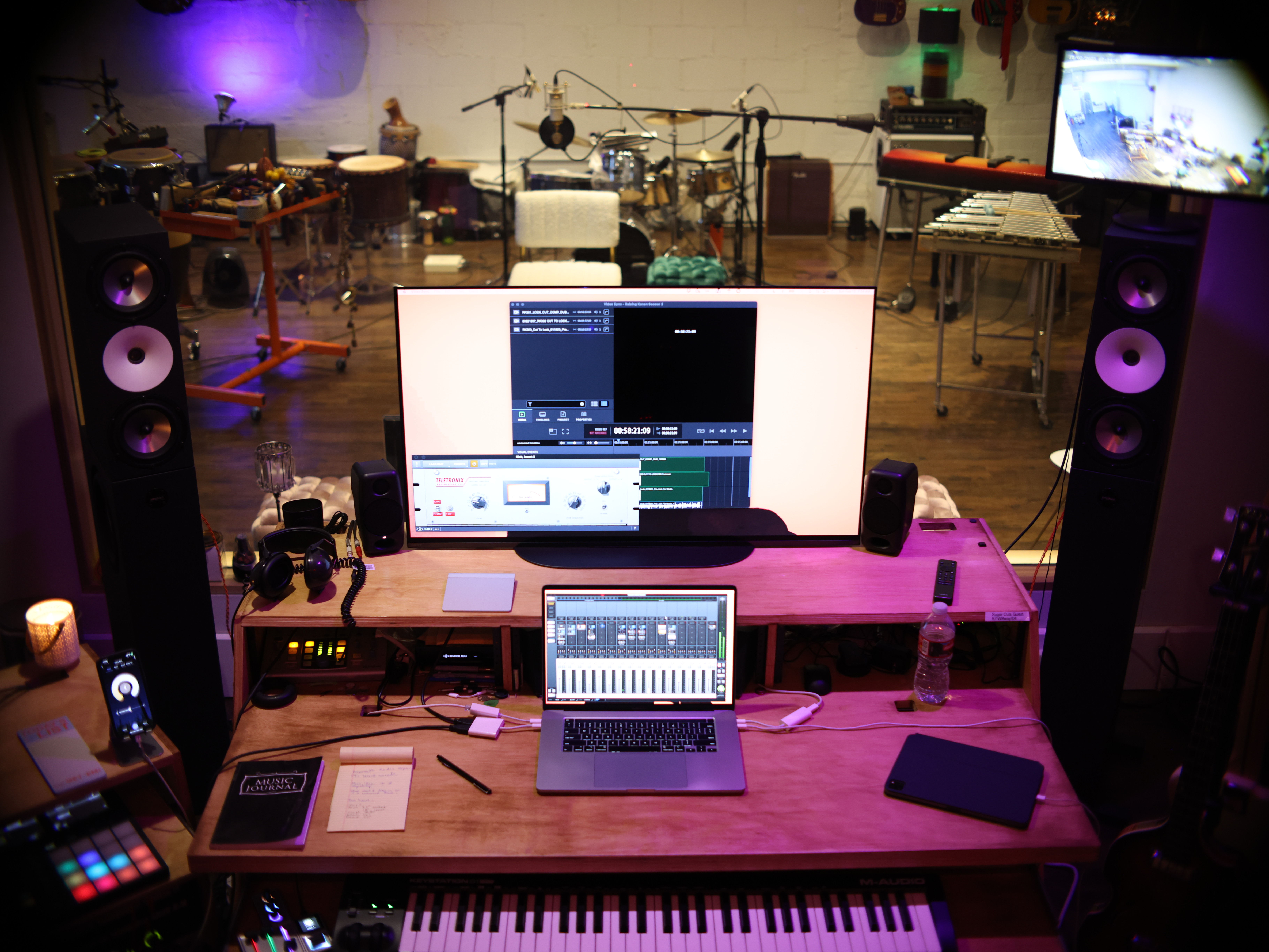
A cut above
Before choosing Amphion, Muhammad auditioned monitors with the thoroughness of a DJ digging through record crates for just the right sample. “It’s really important to audition speakers before you buy them,” he says. “I tried speakers from several major manufacturers, but when I heard the Amphion Two18s, all I could think was: ‘I’ve been looking for these babies for a long time’.” Muhammad took the Two18s back to his studio–along with an Amphion bass extension system–for a two-week trial period and quickly confirmed his initial impressions. “I could hear what was right or wrong in the mix instantly,” he explains. “There was no guess work anymore. I knew exactly which tweaks to make to get where I wanted to go. It was an instant overnight homerun for my mixes from the day I got them.”
Muhammad works in a hybrid analog and digital studio with a separate live and control room. His studio sports a number of instruments and studio tools that inspire him, including keyboards, guitars, and basses, as well as select outboard hardware and a two-inch tape machine. But his monitors have quickly become the functional center of his studio life. “My Amphions are the workhorse of my studio for sure,” he says. “There’s an expediency to my workflow that comes about because the speakers are so clear. They’ve helped me move the work along the assembly line a lot faster, even when I’m jumping back and forth between genres like jazz and hip-hop that have very different sonic signatures. And working quickly means that the mix never gets in the way of the process of creativity.”

Can you handle the truth?
As inspiring as Muhammad finds his Amphion monitors, listening to material on them can be a rude awakening to other engineers working on inferior systems. “These monitors are very revealing and very accurate,” he says. “Many of my friends come in here and they’re excited to play me something and when it comes on they get this pained expression because they’re not hearing things the way they were hearing them on their monitors at home. You spend all this time creating and putting the hours in to make everything sound right and then suddenly it doesn’t, and I get that that’s disappointing. But you don’t have that problem when you start with great monitors.”
Smart investments
With an increasing number of engineers and producers working exclusively in home studio setups, Muhammad recommends up-and-coming engineers prioritize the right monitoring. “A lot of people are working in their bedrooms and making great music, but maybe not great mixes,” he says. “I know that your budget can be spread thin with all the gear out there, but I believe when you spend the money to upgrade a couple of key pieces in your studio, it’s going to return itself. And high quality monitors are one of the best places to focus.” For Muhammad, it is a matter of positioning yourself to achieve your artistic goals. “If music is going to be your occupation and you take it seriously, quality monitoring will take your art so much further,” he says. “You can keep cutting corners by buying inexpensive monitors, but you’ll waste a lot of money in the process, and meanwhile you’re working way too hard and your mixes still aren’t coming across. So save up and get the best tool you can.”

Muhammad also cites other Amphion offerings that are a potential fit for engineers working in smaller spaces or on a more limited budget. “I got a pair of the One12s for the road because at the time I was traveling and needed something that was really portable but still high quality,” he says. “They sound really good.”
High quality, high speed
For Muhammad, the gains in workflow efficiency since working with Amphion monitors have become critical as he and his collaborator Adrian Young have become further entrenched in the world of film and TV scoring. “When you’re working on TV shows, the speed of return that’s expected is very quick,” he explains. “They might give you a picture that’s 55 minutes long with 42 minutes of music and say ‘We need this music in 4 days.’ So you don’t have a lot of time to spend on the mix.” The uncompromising accuracy of the Two18s helps Muhammad make EQ, compression, and level choices right the first time. “It’s vital that you know what you’re hearing when you’re working at this speed,” he says. “With the Amphions I know exactly what’s going on and can decide quickly what adjustments I need to make, so I’m able to get the music done and off to the producers.”
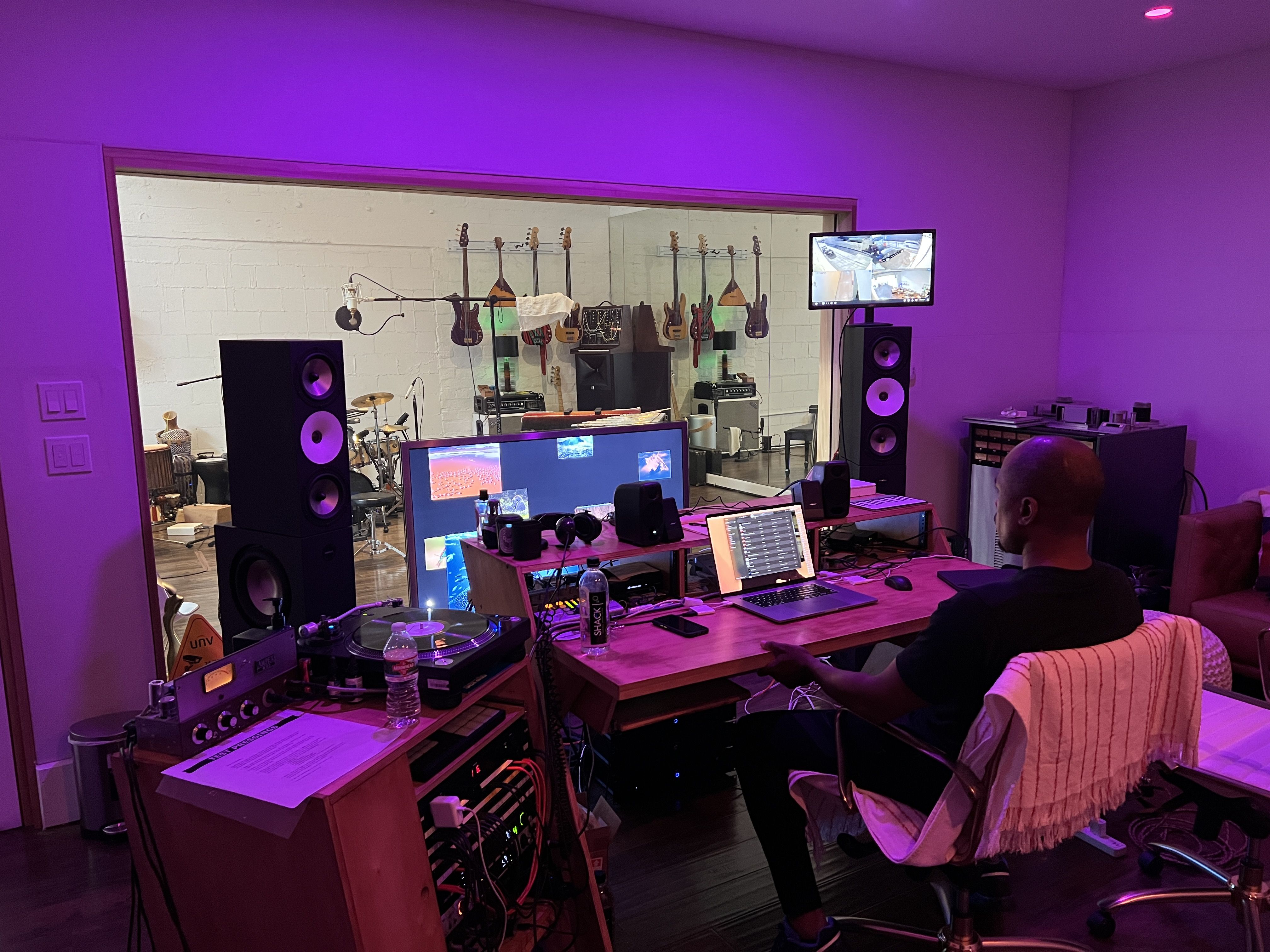
Universal translation
Translation is another key piece of the puzzle for his scoring work. “With TV, there are many playback mediums that people could be listening through,” Muhammad says. “Some will be listening on their smart TV with basic stereo and not the best speaker components, some have very elaborate surround systems, and others will be listening on their earbuds or laptop, streaming a show while they’re on their way to work. It’s very important for us when we’re recording and mixing that we’re hearing the full spectrum of frequencies because that gives our mixes the best chance of translating to all these different environments.”
When it comes to film for theatrical release, Muhammad uses the clarity and dynamics detail of his Two18s and bass extension system to maximize the impact of his work. “With film I try to take advantage of the big, high end speaker systems that a lot of theaters have,” he says. “You want your music to be impactful and punch where it needs to. When I’m mixing an element that’s very high and very soft, I want it to just gently reach out and touch people, whereas when something needs to be very impactful and loud, I want it to hit but not spike in a way that hurts people’s ears or fails to blend in with the bigger picture. So having a monitor system that allows you to hear and make these choices and create balance very quickly and efficiently really lets you achieve that wide dynamic range.”
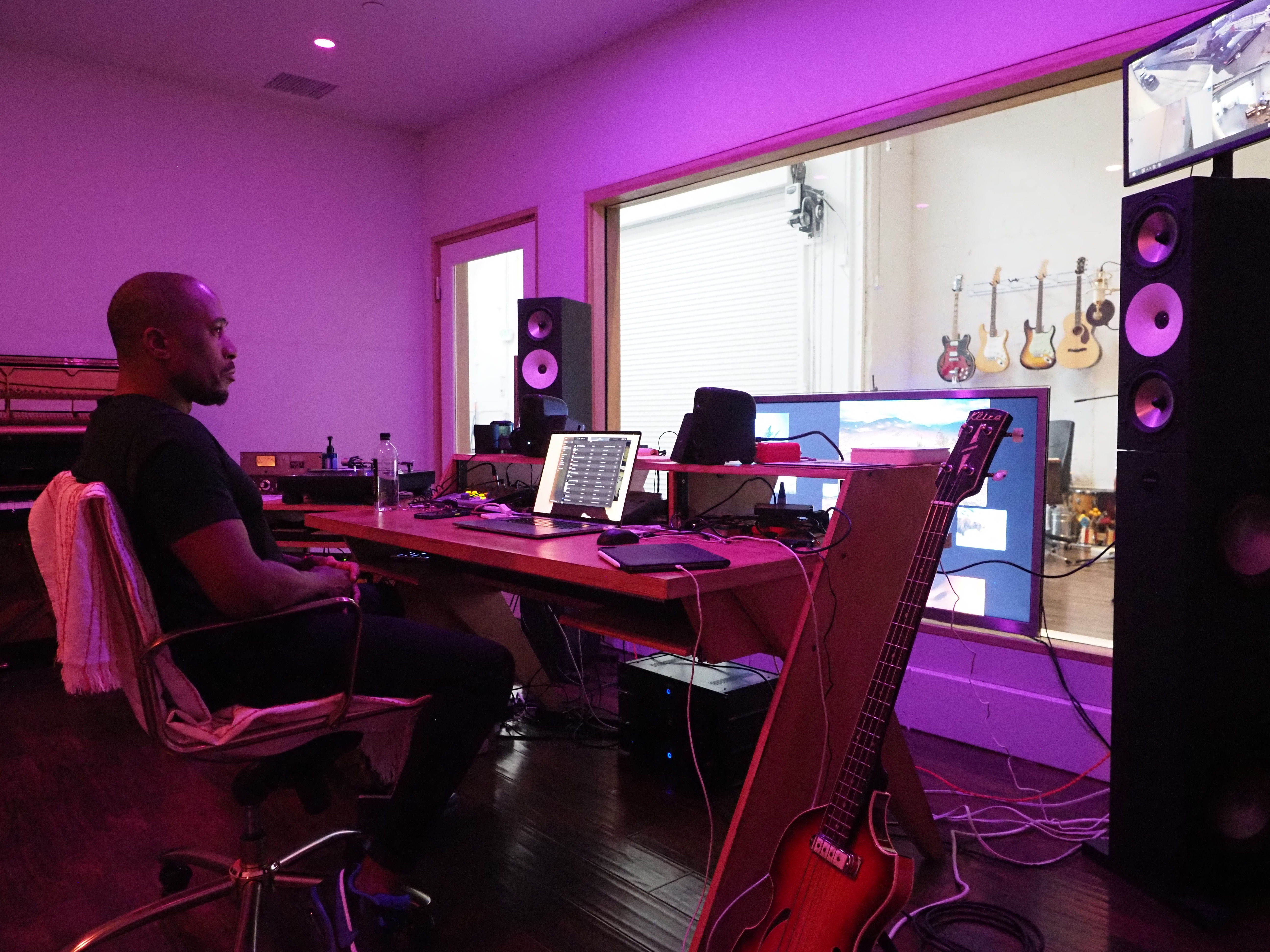
Passion for the music
Muhammad finds that his Amphion speakers allow him to appreciate long-time influences anew, drawing inspiration for his creative process. “I’ll go into the studio sometimes not even to work but just to listen to songs that I haven’t heard in a long time for the pleasure of it,” he says. “It sounds so good, and that turns into another level of inspiration.” He also appreciates the engagement he has with the Amphion team. “They are really great individuals,” he says. “To meet the people who make these products and hear about their passion and goals– I can draw a lot of parallels to my approach to making music. And the results of that passion really comes across in the way their products perform.” For Muhammad, sharing his experience is a means of inviting others into a path to artistic fulfillment. “I know for a fact that if you get the right monitors in your room you’re more than halfway to the finish line,” he says, “and that’s something I want to impress younger people in the industry.”
For more information about Amphion, please visit: https://amphion.fi/
